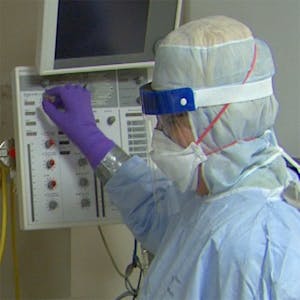The High Level Biocontainment for Healthcare Facilities course offered by the University of Nebraska is a comprehensive 4-week program focusing on the safe care of patients infected with high-level biocontainment pathogens. Through a series of engaging modules, learners will explore essential topics including infection control basics and personal protective equipment, historical and modern disease containment examples, high-level biocontainment in hospitals, and patient intake and other considerations.
The course delves into the fundamentals of intake screening, pathogen transmission characteristics, patient placement, engineering/administrative controls, personal protective equipment, waste management, and decontamination protocols. Learners will gain valuable insights into the historical and modern examples of disease containment, high-level biocontainment in hospitals, and critical considerations for patient intake and care.
By the end of the program, participants will be equipped with the necessary skills and knowledge to effectively manage patients infected with high-level biocontainment pathogens, ensuring the safety of both the patients and the healthcare facility.
Certificate Available ✔
Get Started / More Info
The course modules cover infection control basics and personal protective equipment, historical and modern disease containment examples, high-level biocontainment in hospitals, and patient intake and other considerations. Learners will gain comprehensive insights and skills essential for safe patient care in high-level biocontainment scenarios.
The first module, Infection Control Basics and Personal Protection Equipment, provides a foundational understanding of essential infection control principles and the correct use of personal protective equipment. Learners will engage in quizzes and discussions to reinforce their knowledge and understanding.
The second module, Disease Containment: Historical and Modern Era Examples, delves into historical and modern disease containment instances, including the Black Death, influenza pandemic, smallpox, and more. It provides valuable insights into the historical context of biocontainment and its implications for modern healthcare.
The third module, High Level Biocontainment in Hospitals: The Location and Team, focuses on the critical aspects of high-level biocontainment within hospital settings. It covers diagnostics imaging, laboratory and infection prevention, team assembly and culture, as well as mental and occupational health considerations.
The fourth module, Biocontainment: Patient Intake and Other Considerations, addresses the specific considerations for patient intake and care in high-level biocontainment scenarios. From point of entry screening to risk communications, learners will gain a comprehensive understanding of managing patients in biocontainment situations.
Infectious Disease Modelling course introduces fundamental concepts of mathematical modelling in R. Learn to construct models, calibrate them against data, and make...
Comparative Health Systems offers a comprehensive analysis of healthcare systems in various countries, providing insights into their strengths and weaknesses.
Public Health Perspectives on Sustainable Diets explores the urgent need to address the sustainability of our food systems and the complex relationship between diet...
The Digital Media for Health Outcomes course equips health communication professionals with the skills to create and evaluate effective online health campaigns,...